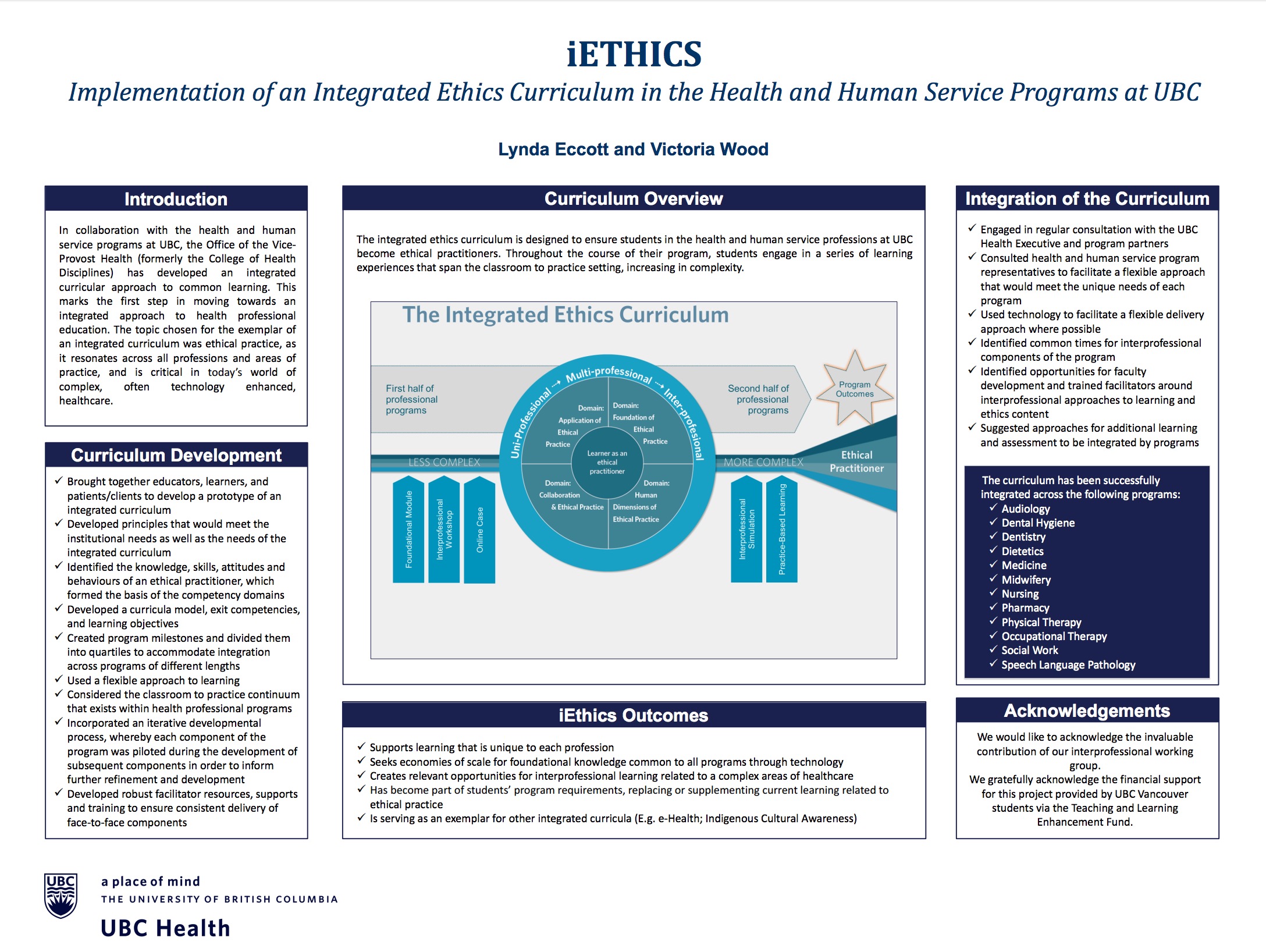| Title | i-Ethics – Implementation of an Integrated Ethics Curriculum in the Health and Human Service Programs at UBC | ||||||||||||||||||||||||
|---|---|---|---|---|---|---|---|---|---|---|---|---|---|---|---|---|---|---|---|---|---|---|---|---|---|
| Faculty/College/Unit | UBC Health | ||||||||||||||||||||||||
| Status | Completed | ||||||||||||||||||||||||
| Duration | 1 Year | ||||||||||||||||||||||||
| Initiation | 01/30/2015 | ||||||||||||||||||||||||
| Completion | 03/31/2017 | ||||||||||||||||||||||||
| Project Summary | In collaboration with the health and human service programs, the Office of UBC Health (formerly the College of Health Disciplines) planned, tested and evaluated a framework for an integrated curricular approach to common learning. This work was supported with a 2014 TLEF grant. Under the umbrella of ‘UBC Health,’ this marked the first step in moving towards an integrated approach to health professional education that supports learning that is unique to each profession, seeks economies of scale for foundational knowledge common to all programs through technology, and creates relevant opportunities for interprofessional learning in complex areas of healthcare. The topic chosen for the exemplar of an integrated curriculum was ethical practice, as it resonates across all professions and areas of practice, and is critical in today’s world of complex, often technology enhanced healthcare. The 2015 TLEF grant was used to develop the online and face-to-face activities that form the curriculum. The Integrated Ethics Curriculum (iEthics) focuses on three pillars of learning: uni-professional, multi-professional, and inter-professional. It consists of four flexible learning activities that represent approximately 12 hours of learning. Each activity has been integrated as a part of students’ program requirements in the 12 health and human service programs at UBC, replacing or supplementing current learning related to ethics. | ||||||||||||||||||||||||
| Funding Details | |||||||||||||||||||||||||
| Year 1: Project Year | Year 1 | ||||||||||||||||||||||||
| Year 1: Funding Year | 2015/2016 | ||||||||||||||||||||||||
| Year 1: Project Type | Large TLEF | ||||||||||||||||||||||||
| Year 1: Principal Investigator | Lesley Bainbridge | ||||||||||||||||||||||||
| Year 1: Funded Amount | 86,067 | ||||||||||||||||||||||||
| Year 1: Team Members | Lesley Bainbridge, Associate Professor, College of Health Disciplines (CHD) | ||||||||||||||||||||||||
| Year 1: Summary | An integrated ethics (i-Ethics) curriculum is being developed to enable UBC’s health and human service programs to prepare students for ethical practice within their professions and in inter-professional teams. The proposed project builds on the existing Flexible Learning TLEF grant “i-Ethics – An Exemplar for Planning, Implementing and Evaluating an Integrated Curriculum in the Health and Human Service Programs at UBC.” By the end of the 2014/2015 grant, we will have developed guiding principles, exit competencies, milestones, learning objectives, a curriculum model, an evaluation model, and piloted two learning activities. The proposed project (commencing April 2015) will (a) identify all specific learning activities that align with the curriculum model (b) develop learning resources (c) test an assessment approach (d) undertake a graduated implementation of the curriculum using proportional representation of students in six programs and (e) evaluate the graduated implementation. | ||||||||||||||||||||||||
| Year 1: TLEF Showcase |  | ||||||||||||||||||||||||
| Project Report | 2015-TLEF-Final-Bainbridge-WEB.pdf | ||||||||||||||||||||||||
| Project Outcomes | Products & achievements: Quartile #1 – Online module and interprofessional workshop; Quartile #2 – Online module; Quartile #3 – Online module and interprofessional workshop; Quartile #4 – Online module. All can be found at: http://elearning.health.ubc.ca Intended outcomes/themes:
Evaluation approach: Post participation online surveys were sent to all students after each activity. Survey data was analyzed for percentage of students that agreed or strongly agreed with statements related to their learning and the effectiveness of the delivery. Limitations of this evaluation is that it relies on students’ perceived learning. We are in the process of working with programs to integrated assessment of learning. Findings: Evaluations of each activity indicate that students perceive the curriculum is relatively effective in teaching them about ethical practice. Evaluations have informed improvements to each activity. The updated activities will be delivered in Fall 2017. Example survey responses:
Dissemination:
Presentation: How to develop an integrated interprofessional curriculum, Victoria Wood Presentation: Integrating ethics content across health professional programs, Victoria Wood
Presentation: An integrated approach to ethics education across health professions, Lynda Eccott
Presentation: An Innovative Integrated Ethics Curriculum, Lynda Eccott
Workshop: Transforming Interprofessional Ethics Education in Health and Human Service Programs at the University of British Columbia, Lynda Eccott Sustainability: A large number of facilitators are needed to deliver each component of the curriculum to over 1,000 health and human service students each year. We have engaged clinical faculty in this role, which has provided opportunities for them to become more involved in teaching at the university. We provide facilitator training, which builds faculty members’ knowledge of the subject area and skills facilitating interprofessional learning. Programs have protected time in their programs that will facilitate the delivery of the interprofessional workshops. The Office of UBC Health has dedicated staff who are responsible for the logistics associated with the delivery of the curriculum and management of the online components. Programs have agreed to recruit one facilitator for every 40 students they have participating in the curriculum. The Office of UBC Health has dedicated staff who will continue to train facilitators. |